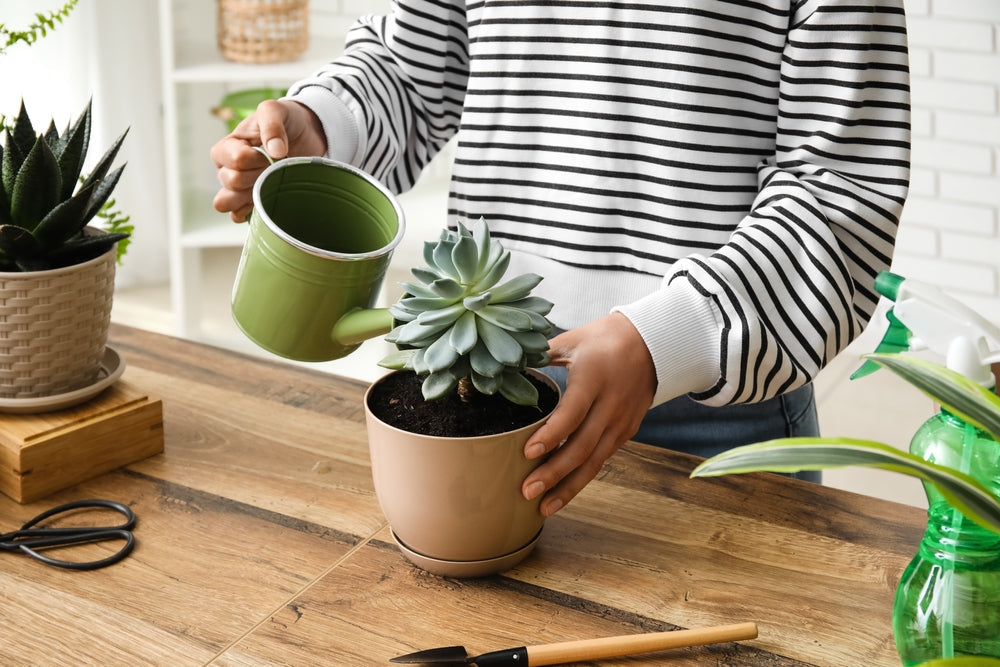
Choosing the Best Water for Your Plants
Share
We all know plants need water to survive, but did you ever stop to think about what kind of water you're giving your precious potted companions? Just like us, plants can be sensitive to the quality of their hydration. Providing the right type of water can significantly impact their health, growth, and overall vibrancy.
So, step away from the tap for a moment and let's dive into the fascinating world of watering your potted plants the smart way!
The Gold Standard: Rainwater
If you have the opportunity, rainwater is often considered the gold standard for watering plants. Why?
- Naturally Soft: Rainwater is naturally soft, meaning it has a low mineral content. This is beneficial because hard tap water can lead to mineral buildup in the soil over time, affecting nutrient absorption and potentially harming roots.
- Nitrogen Boost: As lightning passes through the atmosphere during a storm, it converts nitrogen into forms that plants can readily absorb. Rainwater often contains trace amounts of this natural fertilizer.
- Free and Readily Available (Sometimes!): Collecting rainwater is an eco-friendly and cost-effective way to hydrate your plants.
Harvesting the Liquid Gold:
Collecting rainwater is simple. You can use rain barrels, buckets, or even large watering cans placed outdoors. Just be sure to use clean containers and avoid letting stagnant water sit for too long to prevent mosquito breeding.
The Everyday Choice: Tap Water - Know Your Source
For most of us, tap water is the most convenient option. However, its quality can vary significantly depending on your location. Here's what to consider:
- Chlorine and Chloramine: These disinfectants are added to tap water to make it safe for human consumption. While beneficial for us, they can sometimes be harmful to sensitive plants or beneficial soil microbes. Letting tap water sit out in an open container for 24-48 hours can help chlorine dissipate (chloramine, however, is more stable and won't evaporate).
- Hardness: Hard water contains high levels of minerals like calcium and magnesium. Over time, these minerals can accumulate in the soil, leading to alkaline conditions that some plants dislike. You might notice white, crusty deposits on the surface of your soil or the outside of your pots if you have hard water.
- Fluoride: Some municipalities add fluoride to tap water. While beneficial for our teeth, it can be toxic to certain plants, like spider plants.
What to Do About Tap Water Issues:
- Let it Sit: As mentioned, allowing water to sit can help chlorine evaporate.
- Consider a Filter: If you have consistently hard or heavily chlorinated water, using a water filter (like a Brita pitcher or a whole-house filter) can be beneficial for your plants.
- Diluted Vinegar or Lemon Juice (Use with Caution!): For plants that prefer slightly acidic soil and are suffering from hard water buildup, a very diluted solution of white vinegar or lemon juice (a few drops per gallon) occasionally can help counteract alkalinity. However, use this sparingly and only when you're sure your plant prefers acidic conditions, as over-acidifying the soil can also be harmful.
- Check Your Local Water Report: Your local water authority provides regular reports on water quality, which can give you insights into the mineral content and any additives in your tap water.
The Distilled and Deionized Debate:
Distilled or deionized water is essentially pure water with most minerals and impurities removed. While it's certainly safe for plants, it's generally not necessary for most common houseplants and can be more expensive and less sustainable. In some cases, consistently using only distilled water might even deprive the soil of trace minerals that plants need over time.
The Temperature Factor: Lukewarm is Key
Regardless of the water source, always aim to water your plants with lukewarm water. Shocking their roots with very cold or hot water can stress them. Room temperature water is usually ideal.
Listen to Your Plants:
Ultimately, the best water for your potted plants will depend on your local water quality and the specific needs of your plants. Pay attention to how your plants respond. Look for signs of mineral buildup, leaf discoloration, or stunted growth, which could indicate a water quality issue.
By understanding the nuances of watering and choosing the right type of water, you're taking another step towards becoming a truly attuned and successful plant parent. Happy watering!
